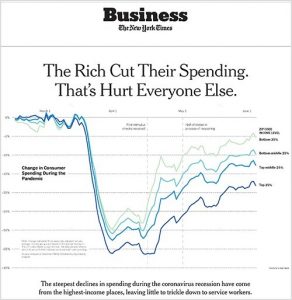May 2020
Incoming faculty member Michael Stepner co-authors a tracker from Harvard-based Opportunity Insights that combines private sector data and the rigour of independent academic analysis to allow policymakers to understand the economy and policy effects in real time: a tool for the Covid-19 era

The global pandemic is impacting nations across the world — borders are closing, schools and workplaces are shutting down and large gatherings are a thing of the past. Much of the world’s economic activity is coming to a halt, hurting businesses, large and small, and workers alike. Policy-makers require up-to-date information to make decisions in this rapidly-changing crisis. But the typical economic indicators lag weeks behind the current day’s economic activity.
A new real-time tracker of American economic activity, developed by incoming faculty member Michael Stepner with colleagues at Harvard and Brown universities, will help policy-makers, non-profits and philanthropists better understand the dimensions of the COVID-19-induced economic downturn and identify targeted, effective recovery efforts.
The Economic Tracker launched this week by Opportunity Insights, a research center based at Harvard University, presents data on the latest economic trends alongside independent academic analysis — providing a well-informed live picture of the rapidly shifting American economy, the researchers say.
“The Economic Tracker is an unprecedented collaboration between private sector businesses and academics, opening the insights that businesses are using daily to the public and gathering them in one place so that everyone can assess the state of the recovery,” says Stepner, who will join the Department of Economics as an assistant professor.
“We are very excited to welcome Michael to the Department of Economics”, said Ettore Damiano, chair of the department. “We are pleased to have a researcher with his energy, enthusiasm and domain expertise join our group of stellar scholars covering a wide range fields, including theory, applied data analysis and econometric methodology.”
Stepner is a public economist studying the relationship between health and economic inequality, with a focus on how public policy can improve the health and financial security of low-income populations. “I look forward to joining the University of Toronto community and continuing to develop research examining the interactions between health and economics, in Canada and around the world,” said Stepner.
Article reproduced in full with the kind permission of the Faculty of Arts & Science.
→ Explore the tracker at the Opportunity Insights website
June 2020 update: Tracking the Tracker
The New York Times features the first paper based on the Economic Tracker
 Michael Stepner co-authored “How Did COVID-19 and Stabilization Policies Affect Spending and Employment? A New Real-Time Economic Tracker Based on Private Sector Data”. The paper examines how the pandemic affected employment, spending and businesses in the United States and evaluates the application of policies such as stimulus payments and the Paycheck Protection Program, a loan designed to provide a direct incentive for small businesses to keep their workers on the payroll. In its coverage of the paper, The New York Times writes that “economists at the Harvard-based research group Opportunity Insights estimate that the highest-earning quarter of Americans has been responsible for about half the decline in consumption during this recession. And that has wreaked havoc on the lower-wage service workers on the other end of many of their transactions, researchers say.”
Michael Stepner co-authored “How Did COVID-19 and Stabilization Policies Affect Spending and Employment? A New Real-Time Economic Tracker Based on Private Sector Data”. The paper examines how the pandemic affected employment, spending and businesses in the United States and evaluates the application of policies such as stimulus payments and the Paycheck Protection Program, a loan designed to provide a direct incentive for small businesses to keep their workers on the payroll. In its coverage of the paper, The New York Times writes that “economists at the Harvard-based research group Opportunity Insights estimate that the highest-earning quarter of Americans has been responsible for about half the decline in consumption during this recession. And that has wreaked havoc on the lower-wage service workers on the other end of many of their transactions, researchers say.”
Stepner is featured prominently in the article, and comments that “one of the things this crisis has made salient is how interdependent our health was. We’re seeing the mirror of that on the economic side. In the near future,” he says, “I hope to turn my attention to measuring Canadian economic activity in real time as well.”
